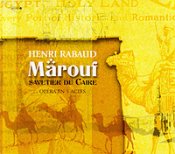How welcome, then, is the release of a fine recording of Rabaud's biggest claim to fame. The French label Accord, recently the source of a number of fine new recordings of rare romantic works has, in this case, brought to compact disc a 1976 performance from the Orchestre Philharmonique des Pays de la Loire under Jesus Etcheverry. As is usual with Accord sets, the packaging is attractive and the sound quality of the first rank. The notes and libretto are in both French and English.
Marouf is based on a tale from the Arabian Nights. The title character, as drawn by Rabaud and his librettist Lucien Nepoty, must certainly be one of the most passive protagonists in operatic literature! Our Cairene cobbler isn't ambitious, clever, or brave. Rather he trusts to luck, or perhaps the will of Allah. When his "Calamitous Spouse" drags him before the law for beating her, though innocent, he accepts his punishment without a word in his own defense. He does at last choose to flee the harpy, and takes to the high seas with a group of mariners. But shortly thereafter he finds himself beaten and robbed far from home.
Then fortune smiles. He meets Ali, a childhood friend who'd made good. With Ali's help, Marouf is passed off as the richest of all merchants, who's treasure-laden caravan is just a few days distant. Convinced, the Sultan offers Marouf his daughter, the princess Saamcheddine. Naturally his story begins to crumble as time passes. Marouf secretly confesses to his new bride that he's in fact no merchant at all, but a poor cobbler. The gracious and beautiful Saamcheddine hardly seems bothered that she's been married off to a poverty-stricken con man. She joyfully flees with Marouf to share his destitute life. But such a tale could hardly end in this fashion! A chance encounter with a genie resolves all, and Marouf's supernaturally created caravan arrives just in time to save them from the Sultan's pursuing henchmen.
It is a preposterous story that is meant to amuse, rather than to move the emotions. In fact Marouf's servile manner and vocal lines filled with endless sing-song arabesque started grating on me after a bit--that is, until I encountered his beguiling Saamcheddine! The couple's Act 3 love duet is perhaps the musical high point of the opera. For a moment, one can vicariously feel Marouf's infatuation indeed.
"Modernism is the enemy" was a favorite dictum of the Rabaud's, so it's no surprise that his opera has little in common with the works of such near contemporaries as Arnold Schoenberg or even his compatriot Maurice Ravel. There's hardly a hint of the desperate passions found in contemporary verist works either, such as Zandonai's Francesca da Rimini or Montemezzi's L'amore dei tre re. Rather the name which most often springs to mind while listening to Marouf is that of his professor, Massenet--especially in that composer's lighter and more fanciful moods, found in operas like Esclarmonde or Cendrillon.
Like Massenet, Rabaud's music is suave, melodious, and meticulously crafted. Everything is paced with an astute sense of proportion. But the observant ear will also detect many fascinating "twentieth centuryisms"--hints of Straussian and Debussian harmonies that delight the ear and set his music apart from that of his more famous teacher. He also boasts a formidable orchestral technique.
Rabaud's opera doesn't aim for the heavens, but it achieves its more modest goals with such ease and facility that one cannot help but feel a certain delight in it. But I'm curious to know how he treated weightier themes. A list of his operas suggest a broad range of subjects, including tragic ones, such as his 1923 opus L'appel de la mer, based on the same story as Vaughan Williams's Riders to the Sea. One can only hope that the appearance of recordings such as this Marouf will spur greater interest in Rabaud's entire oeuvre, and lead to more revivals and recordings.
As to the performances, the principal roles are well cast. Michael Lecocq sings Marouf with more of an eye towards emphasizing the character's idiosyncrasies, rather than trying to achieve emotional expressiveness. Whether this is a good thing or not may depend upon personal taste. Anne-Marie Blanzat's Saamcheddine is, by contrast, both poised and youthful sounding--the perfect aural picture of an eastern princess.
Despite the scarcity of Marouf on operatic stages, there is a competing recording on the Gala label at a bargain price. It also boasts a fine performance by the Orchestre de Radio-Televsione Francaise from 1964 under Pierre-Michel LeConte. It's Marouf, Henri Legay, takes the opposite tack from Lecocq's, and sings the role with great expressive intensity. There are a number of downsides though. The sound is good, but not as clear as the new Accord set. More importantly, perhaps, are the presence of some cuts, and, as with all Gala sets, no libretto.
For American collectors, Accord got American distribution only as of last February, and currently many of their titles, including Marouf, are not available from principal online outlets. They are available both directly from Premiere Music Distributors, and from Records International. I contacted Premiere, and they assured me that Marouf would soon be more generally available, as it is already in Europe.
Eric D. Anderson
